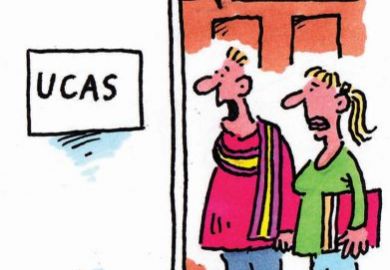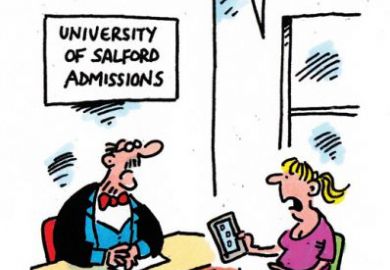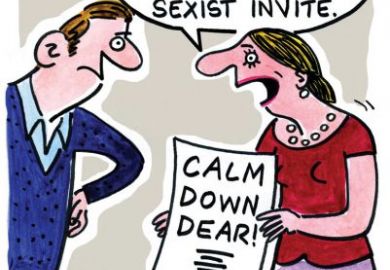
Hundreds of students at the University of Texas at Austin are to carry dildos between classes in protest against a law permitting people to bring guns on campus, The Guardian reported on 25 August. Shortly after a CocksNotGlocks rally on 24 August, students strapped large dildos to their backpacks to show their anger at the new “campus carry” law that came into effect this summer, the paper said. “We’re just trying to fight absurdity with absurdity,” said student Rosie Zander, who pointed out that dildos are banned on campus under university and state obscenity rules but semi-automatic weapons are not. “We have crazy laws here but this is by far the craziest, that you can’t bring a dildo on to campus legally but you can bring your gun,” she said, although university authorities are exempting the sex toys under “protected political speech”. With almost 5,000 dildos distributed on campus so far, it seems that sex toys and guns are, as one protester put it, “in it together for the long haul”.
With their “flame-haired” beauties and “flickering log fires”, the cliché-filled canon of Mills & Boon has seldom troubled English literature students at university. But this may change if scholar and lifelong romance literature fan Val Derbyshire has her way, The Guardian reported on 25 August. Arguing that the trashy romance paperbacks should be taken seriously as feminist texts, the doctoral researcher at the University of Sheffield claimed “they are always much more intelligent than you think”. “There really is literary value in them,” insisted Ms Derbyshire, who will lead two events at Sheffield’s Festival of the Mind later this month making the academic case for the novels. “It is such a shame that they have been so vilified and that people treat them as...the black sheep of the literary family,” she said. If titles like Staff Nurses in Love and Tethered Liberty do make it on to student reading lists, how long before seminars on the Fifty Shades of Grey trilogy become commonplace?
Influential New Yorker writer Malcolm Gladwell returned to one of his favourite subjects last week – the folly of giving money to vastly wealthy Ivy League universities. In one of his very few non-sports-related tweets on 24 August, Mr Gladwell took aim at an advert for Princeton University’s Annual Giving programme, which used a photo of student Isao Anzai standing with his proud doctor parents. “Even with $23 billion in the bank, Princeton has not lost sight of its educational mission,” remarked the author of The Tipping Point, who last year compared a banking mogul’s $400 million (£303 million) donation to Harvard University to “volunteering at the Hermes store on Madison Avenue”. Mr Gladwell refrained from mocking the advert’s caption, however, which described how Mr Anzai’s parents “are on campus in a heartbeat” whenever they have the chance to see their son – something most students would surely find unbearable.
Thousands of sky-watchers were left disappointed after a university sensor that predicts when the Northern Lights will be visible in the UK was set off by a lawnmower, BBC News online reported on 25 August. An automatic alert sent to those on the Aurora Watch mailing list on 23 August was withdrawn hours later after it emerged the “massive spike” in data was actually caused by a mower going too close to a magnetometer at Lancaster University. Scientists from Aurora Watch later explained that any metal placed on the instrument or machinery operating nearby could trick it into recording more geomagnetic activity than was actually present, leading to the false alarm over the aurora borealis. “We'll work with the facilities team to try and avoid an incident such as this occurring in the future," they said.
A University of Oxford professor has hit out at car hire firm Avis for trying to levy an apparent “Brexit tax”, The Daily Telegraph reported on 26 August. Lord Krebs, a former chairman of the Food Standards Agency, said he felt “outraged” when an Avis worker attempted to charge him what was described as a “Brexit tax” of €2.54 (£2.17) when he returned a pre-paid rental car in Marseilles. “I…said ‘well we have not left the EU so I am not going to pay a Brexit tax and he agreed to waive it,” explained the zoologist. Avis has apologised for the “erroneous charge”, which it added was “in no way related to Brexit”. However, it probably won’t be the last time that Lord Krebs, a former president of the British Science Association, or his scientific colleagues are inconvenienced by Brexit.
Register to continue
Why register?
- Registration is free and only takes a moment
- Once registered, you can read 3 articles a month
- Sign up for our newsletter
Subscribe
Or subscribe for unlimited access to:
- Unlimited access to news, views, insights & reviews
- Digital editions
- Digital access to THE’s university and college rankings analysis
Already registered or a current subscriber?



